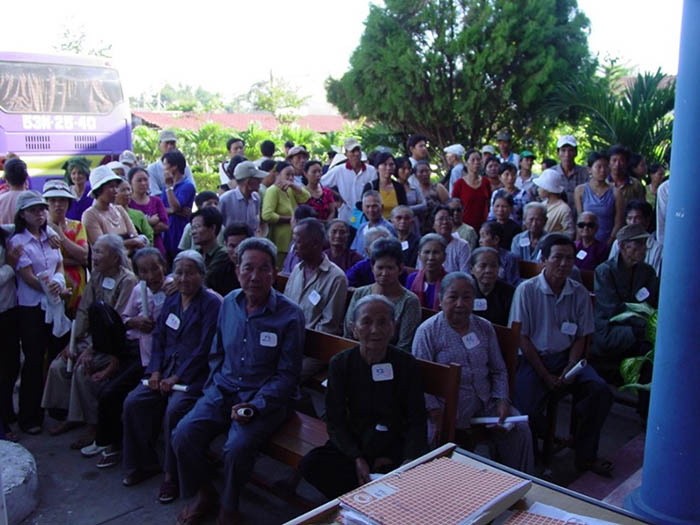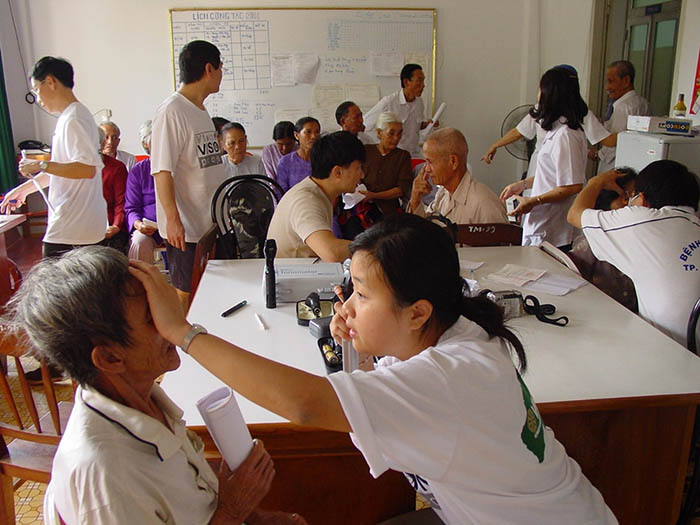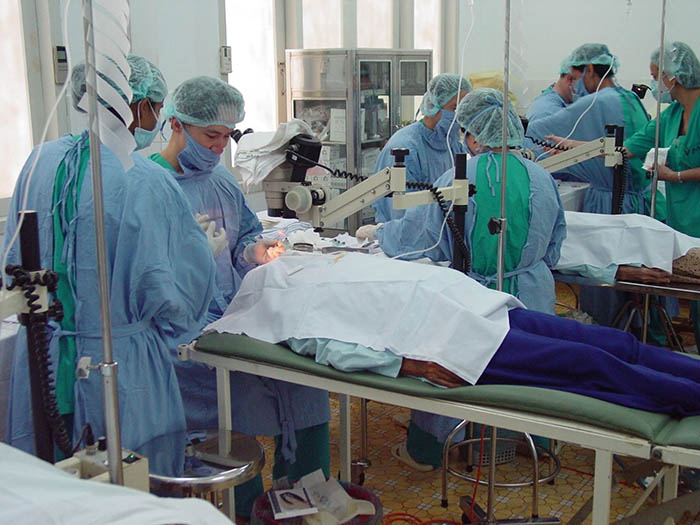Down memory lane …
Translated from Dr Tam Tran article: Thầy thuốc kể chuyện by Dr Phuong Anh
Lời cảm tạ:
Tôi xin chân thành cảm tạ Bs Phương Anh, nữ bác sĩ thuộc thế hệ một rưởi, đã chuyển ngữ bài “Thầy Thuốc Kể chuyện” sang tiếng Anh đễ giúp các thế hệ nối tiếp đọc được và hiểu được hoàn cảnh và tâm trạng của thế hệ đầu tiên tại sao họ đã đau xót lìa bỏ quê hương và cái nhìn sau đó khi trở lại thăm nom cố hương của mình.
Được biết Bs Phương Anh là người chủ xướng chương trình “SỐNG VUI SỐNG KHOẺ” trên đài truyền hình TV SBTN Úc Châu. Chương trình hướng dẫn y tế phát hình hằng tháng trên TV SBTN và trên YouTube qua lời giới thiệu của xướng ngôn viên Lê Vũ đễ giúp Cộng Đồng Việt cải thiện sức khỏe.
Cám ơn bác sĩ Phương Anh
Bs Trần Thanh Tâm
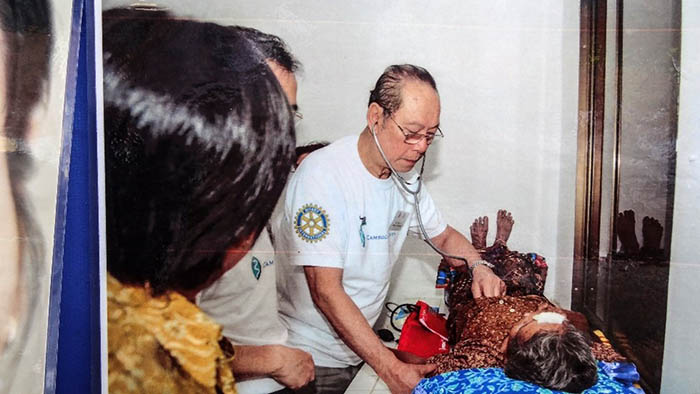

Một Thương phế binh
Down memory lane … ( Thầy thuốc kể chuyện.)
9.30pm April 2004. A Saigon Tourist bus loaded with more than thirty Vietnam Vision Projects Australia (VVPA) volunteers, stopped suddenly in front of a hotel.
Dated neon lights above the veranda cast an eerie electric blue into the thick night, illuminating the dust covered billboard, advertising our accommodation for tonight as ĐỒI DƯƠNG HOTEL (1), complete with its designated “three star” status.
One by one, we unloaded and filed into its dim lobby, laden with equipment and luggage.
Faint sighs of relief could be heard; there would be a promised rest and a good night’s sleep after twelve hours of non-stop work in the unfamiliar tropical heat of a nearby local hospital sixty minutes by bus. We had successfully completed 120 cases of cataract surgery that day, a fete for our very first day on my first humanitarian trip to Vietnam. But before we could all completely settle and relax, Dr. Phuoc Vo, a familiar figure with a voice hoarse from giving instructions all day, rang out that our wakeup call would be at 6am the next morning, for prompt departure at 7am, to be ready for work by 8am sharp. There were more than 150 cases scheduled and waiting the very next day!
After receiving our keys, my room partner, Dr. Nghi & I retreated to our room. The first thing on our list was to unwind with a shower, but there was no bathroom to be found. Next to my bed was just a closet containing a toilet, equipped with a handheld shower-head dripping into a bucket by its side. Pondering whether we were to shower from the bucket with the provided dipper, Dr. Nghi made a joke that it was Hotel Liên Xô (2) but a bath, by whatever means, was still a bath, so that settled it.
It was only after our wash that we noticed our room fluctuating in brightness from a single, naked, blinking light tube dangling off the ceiling that failed to turn off when we tried to switch it off at the wall. The oscillating dimness threw a faint light on the off-white bed linen, highlighting various questionable blotches and stains. We decided that it was safer to sleep on our own spread out clothes, but only after removing the offending globe from its socket. We were exhausted from the day’s adventure, but before we knew it, we awoke to the 6am wake-up call the next morning.
More than thirty members, including the bus driver, descended into the hotel’s dining room in high spirits for breakfast, despite there being only three choices offered on the menu. The hotelier’s excuse was that they were unprepared for such a large group!
. Bread roll and a single fried egg
. Bread roll and a can of sardine
. Chicken rice noodle soup (phở gà) (3)
Keeping in mind that there was an outbreak of bird flu that year in Vietnam, “fried eggs” was not a risk we wanted to take. Sardine, I am not fond of, and “phở gà” was the only ideal choice since I wanted to revisit that nostalgic, authentic, home-made flavour. With the rationale that if you boiled the chicken long enough, it should be safe to eat. It was the right choice as I am still alive and hearty today!
Seven in the morning, the bus was loaded and ready to depart for the next hospital in Binh Thuan. The trip took one hour. We passed by salt farms that seemed to stretch for miles, dotted with glistening mounds of white crystal reflecting the morning dawn like diamonds on a white sheet. The salt farms were labored by dark, thin farmers, blackened by the sun and hard bent to their task.
In contrast, we were full of energy after a good night’s rest, laughing and chatting on the meandering bus. Occasionally, there would be a loud, infectious cackle- not unlike a kookaburra- from Allison, a young volunteer that triggered us all to laugh in concert.
The bus finally arrived at the hospital and was slowly trying to manoeuvre its way through throngs of patients and their relatives who had camped outside the hospital, some for many days prior, setting the urgency to our moods.
We immediately commenced work and completed 180 cases of cataract surgery that day- more than were scheduled! Dr. William Trinh, optometrist Van Tran, Dr. Nghi, Dr Peter Wong, Dr. Phuoc Vo and I provided pre-op assessment for more than 200 patients on the day. Not one less, or they would not have been able to have their cataract surgery and that would have been a tragedy.
While we were busy at work, Mr. Minh and Mr. Chuan, with the task of patient safety and security of medical supplies, kept gazing my way, smiling conspiratorially. Finally, when Mr. Minh led another patient my way, he whispered that the waiting ladies thought that I was a Caucasian Australian and were gossiping and complementing the fact that I spoke Vietnamese very well for a Westerner! I later joked to one of the ladies that I was indeed trying to learn Vietnamese so hard that I had forgotten all my native English!
I pondered if it was because I was taller than the average Asian, and had lived a privileged life in Australia, paled from years of working indoors.
I was since nicknamed: “the Westerner that spoke fluent Vietnamese.” In public I would laugh and be jovial with friends when reminded, but in solitude, I am often saddened and would reflect:
“Dear fellow countrymen from Binh Thuan. I am like you, born and bred in this motherland of ours. Yet I am the lucky one, with freedom, food and nourishment, so bountiful in love and care that I have become “white”, while you live in hardship and poverty, working the earth with your bare hands for each morsel to survive from day to day, not knowing what tomorrow brings. Who do we blame for this injustice? What can we do but share what we can, even if a little.”
Late into the afternoon while we were still busy with our examinations, Mr. Nhan, with the role of chaperoning patients from pre-op to the operation, rushed from the operating theatre to search for me with a message that one of my patients was either highly agitated or fainted on the operating table, and was being too difficult for the surgeons to work on.
Immediately, I donned the required surgical gown and rushed to the operating theater to find Dr. Son calmly operating on the patient! Though he stated nonchalantly that the patient was agitated and had dangerously high blood pressure that needed closer monitoring for a safer outcome, her blood pressure had exceeded 200mmHg, with a pulse rate of 160bpm! This was understandable for she was above 70 years of age, and this was her first major operation. She had been blind for two years from cataract after five years of blurred vision. Fortunately with medications and close monitoring, she had a full recovery.
We were packing up and ready to call it a day by 6pm when Dr. David Worsnop wanted to remove a facial tumor that he had noticed on one of the patients. So, we all happily waited for him to complete his “overtime” before dinner.
During our wait, I made an unplanned post-op visit to the wards. Patients and relatives were crowded and overflowing onto the verandas, with hardly room to sit let alone lie down! They came from near and far; those from poor, distant villages travelled by primitive transportation and could not afford nearby accommodation. They camped out the nights on the veranda and street, trying to care for their sick ones.
The earlier complicated elderly patient’s relative spotted me and directed me to her metal-framed bed, lined with a straw mat. She was surrounded by relatives squatting on the floor. Not one square tile in the room was left unoccupied by other patients and their relatives! After meandering through the throngs of bodies, I was happily greeted by a grateful patient who sprang into an upright position. I calmly reassured her and instructed her to slowly lie down to allow her newly operated eyes to heal. After a short examination and further reassurance and instructions to the relatives, I left with mixed emotion, uncertain of the happiness and sadness settling in my heart.
It was 10pm by the time we sat down for dinner that second night at the hotel.
After post-op ward round the next morning, we again boarded the Saigon Tourist bus to return to Saigon.
That was my first trip with Vietnam Vision Projects Australia in 2004. The years that followed- now tallied at over ten- I worked closely with VVPA.. . going to rural and remote areas of Vietnam and Cambodia….go to places where there are less fortunate people., each year a happy memory, a new experience, a new challenge in the life of a doctor and refugee.
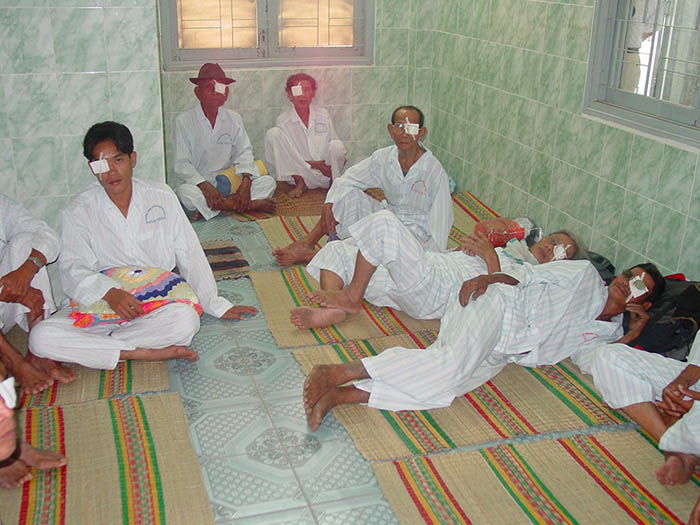
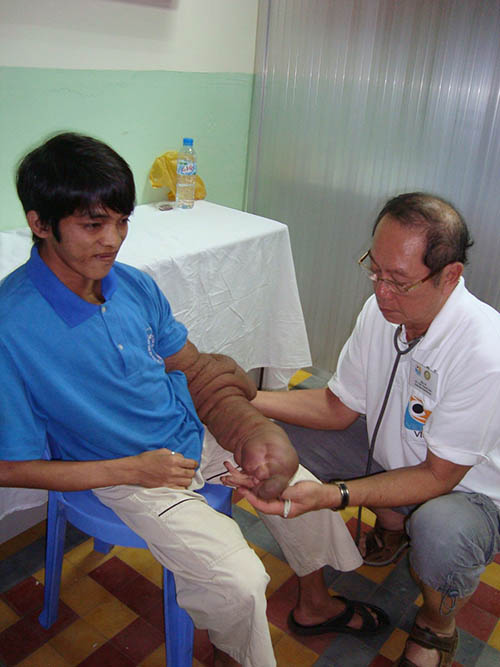
I am glad and proud to see a volunteer group that started from about a dozen people called VVPA (Vietnam Vision Projects Australia) and today has exceeded 200 volunteers from every State of the country. Australia, and since 2015 it has become an official Australian charity organization with the new name Australian Health Humanitarian Aid (AHHA).
We are bound by a common goal: to help the less fortunate.
Life is short, but fifteen years can be arduous and long. In fifteen years, we have weathered and greyed but each year held a lifetime of love in giving and receiving, of treasured memories unequalled, of adventures unparalleled, and friendships tried and tested…
A single happy moment in life can be a lifetime of happiness.
Translated from Dr Tam Tran article: Thầy Thuốc Kể Chuyện by Dr Phuong Anh
Footnotes:
(1) Đồi = Hill; Dương = poplar; ocean (noun) or solar; male; positive (adj)
(2) Liên Xô = Russia; liên (liên tiếp) = continuously + xô = bucket
(3) Phở gà, a Vietnamese specialty that may vary from region to region depending on ingredient availability but remains close to one basic recipe.

